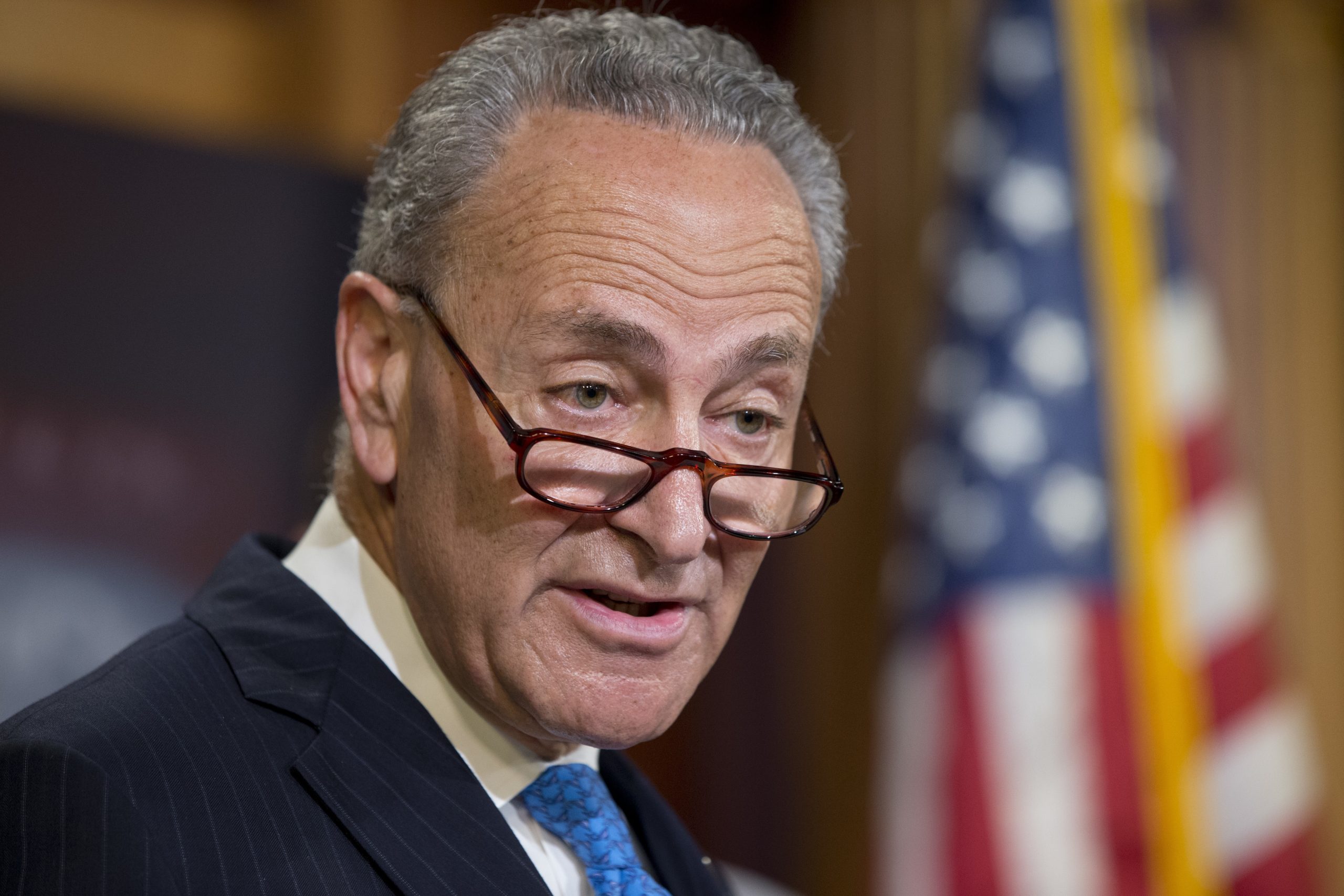The U.S. Senate turned unexpectedly comedic this week when Majority Leader Chuck Schumer faced a wave of laughter from both sides of the aisle after attempting to downplay a New York Times/Siena College poll showing that most Americans blame Democrats for the ongoing government shutdown.
The moment came during a tense floor debate over funding negotiations that have brought Washington to a standstill. Schumer, appearing frustrated, tried to discredit the poll but instead triggered an uproar among his Republican colleagues.
The Poll That Sparked Laughter
“Now, I know the leader is going to show a poll that says Democrats will be blamed for the shutdown,” Schumer said, referring to the data from The New York Times and Siena College. “There are many more polls that show Republicans are to blame. The question in that poll is biased.”
When Schumer went on to say, “In the New York Times, but it’s biased,” the chamber broke into laughter. Even some Democrats reportedly chuckled as the New York senator, long known for his combative style, realized he had undercut one of his party’s most reliable media allies.
“I don’t always believe the New York Times… You can be sure of that,” Schumer said, pausing as laughter echoed through the Senate chamber. “Neither do you.”
The clip quickly circulated online, with pundits calling it one of the most ironic moments of the shutdown debate. Schumer, who has frequently cited The New York Times in past speeches to bolster Democratic positions, suddenly found himself distancing from the outlet’s findings when they didn’t fit the narrative.
The Numbers Behind the Shutdown Blame
The New York Times/Siena poll, conducted just before the October 1 budget deadline, painted a grim picture for Democrats. Only 27 percent of respondents said they supported Democrats holding up government funding over demands to expand Affordable Care Act tax credits and guarantee taxpayer-funded healthcare “for all.”
Meanwhile, 58 percent of independents and 76 percent of Republicans said the shutdown was unnecessary and politically motivated. Even among Democratic voters, a notable share expressed frustration with party leadership’s refusal to compromise.
Analysts said the data underscored growing public fatigue with budget brinkmanship, particularly when core government services begin to feel the pinch.
https://rumble.com/v6ztf9e-watch-chuck-schumer-laughed-off-the-senate-podium-after-saying-nyt-is-biase.html
Health Care and Immigration at the Center of the Fight
At the heart of the budget standoff is a dispute over the Democrats’ push to include funding for expanded healthcare access — including benefits that Republicans argue would also cover illegal immigrants.
Senate Republicans and the White House have rejected those provisions outright. Vice President JD Vance criticized the proposal during a briefing, calling it “a $1.5 trillion spending package that funnels hundreds of billions to illegal aliens while American families can barely afford their own healthcare.”
Vance added that the administration would not “allow Washington to bankrupt taxpayers for political optics.”
Democratic leaders, including Schumer and House Minority Leader Hakeem Jeffries, have argued that their package would protect middle-class families by preventing sudden hikes in insurance premiums. But the party remains divided on whether to continue using the shutdown as leverage to force the issue.
Republicans Seize the Moment
Speaker of the House Mike Johnson placed the blame for the shutdown squarely on Democratic leadership, saying Schumer and Jeffries were “holding the nation hostage for political gain.”
“This is how the system works,” Johnson said in a press conference. “Senator Schumer made a decision to hand over the keys to the president, and now he’s trying to blame everyone else for the consequences.”
Johnson said President Donald Trump had taken no joy in the situation but was determined to use the opportunity to reset federal spending priorities. “The president takes no pleasure in this,” Johnson said. “But when Democrats refuse to govern responsibly, someone has to make tough choices.”
Trump and Vought Prepare Federal Cuts
Hours after Johnson’s remarks, President Trump posted on Truth Social that he would be meeting with Office of Management and Budget (OMB) Director Russ Vought to discuss which agencies and programs would face immediate cuts.
“I have a meeting today with Russ Vought… to determine which of the many Democrat-run agencies, most of which are political scams, should be cut — and whether those cuts will be temporary or permanent,” Trump wrote.
The president added, “I can’t believe the Radical Left Democrats gave me this unprecedented opportunity. Maybe this is their way of quietly helping MAKE AMERICA GREAT AGAIN.”
Sources inside the administration say OMB has already frozen billions in spending for nonessential infrastructure projects, including several in New York City. Agencies have been instructed to prepare contingency plans, delay payments, and reallocate funds toward “critical national interests.”
Johnson later confirmed that Vought had briefed House Republicans in a 45-minute conference call. “He’s in a tough position,” Johnson said. “He’s deciding which programs, personnel, and policies are essential — and that’s not a fun task. But it’s the responsible one.”
Public Frustration Mounts
For most Americans, the shutdown has become another exhausting episode in a long line of political standoffs. Federal workers are bracing for delayed paychecks, while key agencies have begun scaling back operations.
Public sentiment mirrors frustration across party lines. Voters say they are tired of both sides using budget deadlines as political theater. But polls suggest Democrats, as the party in power in the Senate, may shoulder more blame this time.
Independent political analyst Michael Warren said, “Voters don’t care who wins a messaging war; they care about results. When the government shuts down, whoever’s in charge gets the blame — and right now, that’s Chuck Schumer.”
The Laughter That Told the Story
The Senate laughter that erupted during Schumer’s remarks encapsulated more than just political irony — it reflected fatigue within the chamber itself. Lawmakers have spent weeks trading accusations and soundbites instead of resolving the impasse.
One Republican senator was overheard saying, “When even Chuck Schumer doesn’t believe The New York Times anymore, you know the story’s bad.”
Political commentators were quick to seize on the moment. Conservative analyst Byron York said the exchange symbolized “the collapse of credibility among Democrats who have relied on friendly media for years.” Progressive commentators, on the other hand, defended Schumer, arguing that the poll’s methodology overstated Republican support and failed to capture the nuance of voter sentiment.
Still, the laughter — spontaneous, bipartisan, and caught on camera — may become one of the defining images of the 2025 shutdown.
A Shutdown with Political Consequences
If the deadlock continues, the fallout could be severe. Markets have already shown signs of unease, and some economists warn that extended disruption could slow the economy heading into the holiday season.
The White House insists it is prepared to endure short-term pain to achieve long-term fiscal reform, while Democrats accuse Trump of manufacturing a crisis to justify sweeping budget cuts.
Behind closed doors, however, some Democratic aides privately acknowledge that the shutdown strategy may have backfired. One unnamed staffer told reporters, “We thought the public would rally around protecting healthcare. Instead, people just want the government open again.”
Republicans see an opening. If voters continue to blame Democrats, the shutdown could shift momentum heading into next year’s midterm races, especially in competitive Senate seats.
The Road Ahead
Negotiations are expected to resume next week, though there’s little sign of compromise. Republican leaders say they’re willing to fund the government through a temporary extension if Democrats drop their healthcare expansion demands. Schumer has so far refused, saying any deal must include “real protections for working families.”
For now, the standoff continues — and the laughter in the Senate chamber remains a vivid reminder of how deeply divided Washington has become. What started as a debate over healthcare funding has turned into a broader test of political credibility, leadership, and public patience.
In an era where both parties battle not just for control of government but for control of the narrative, even a moment of laughter can carry a powerful message. For Chuck Schumer, that message was unmistakable: when voters start blaming Democrats, even friendly media headlines can’t save the story.

Sarah Mitchell is a bestselling novelist recognized for her insightful and emotionally resonant stories that explore the complexities of human relationships. Originally from Denver, Colorado, Sarah grew up in a family of teachers who nurtured her curiosity and love for storytelling. She studied psychology at Stanford University, where she became fascinated by the intricacies of human behavior—an interest that would later shape her writing career. Sarah’s novels are praised for their nuanced characters, intricate plots, and ability to capture the subtle tensions that define love, friendship, and family ties. Her breakthrough novel, The Spaces Between Us, became an instant bestseller, lauded for its honest portrayal of strained family relationships and the fragile bonds that hold people together. Since then, she has published several works that continue to captivate audiences around the world. Outside of her writing career, Sarah is passionate about mental health advocacy and often partners with organizations to promote awareness and support for those struggling with emotional well-being. Her personal life is quieter—she enjoys hiking in the Colorado mountains, practicing yoga, and spending time with close friends. With each new book, Sarah Mitchell cements her reputation as a writer who illuminates the beauty and struggles of human connection.









